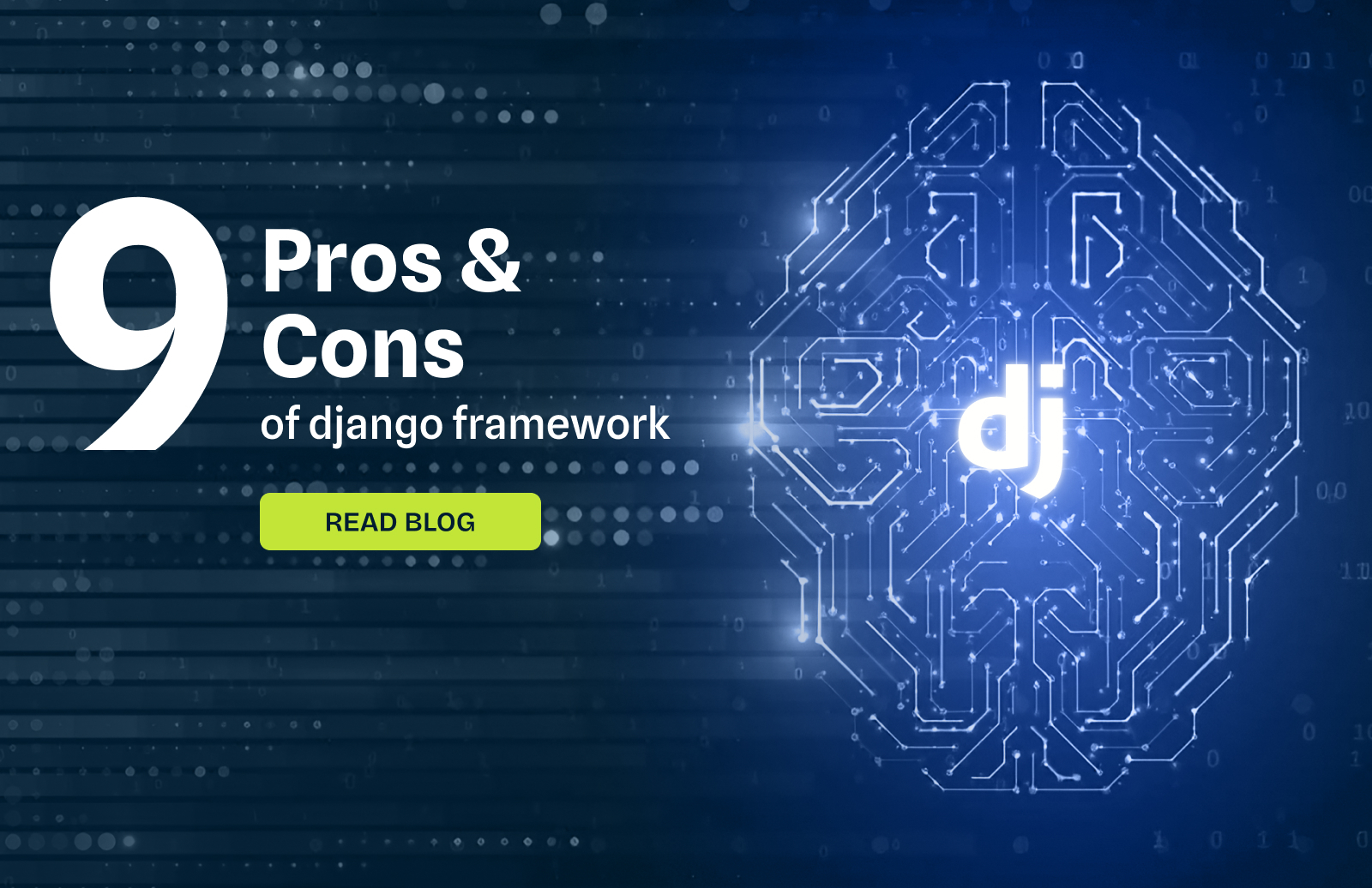9 Pros and Cons of a Django Framework
When planning your next web project, your chosen web builder app can make all the difference in development speed, ease, and scalability. One of the most popular development apps out there is Django. But is this the best option for you?
Django development company is powerful and packed with features, yet like any tool, it has strengths and limitations. Let's dive into Django's 9 key pros and cons so you can make an informed decision.
Why Should You Care About Django?
If you've already dabbled in web development or are considering starting, you've probably come across Django. It's a high-level Python web app development company for rapid growth and clean, pragmatic design. But what does this mean in practice? In simple terms, Django is all about efficiency, making it a solid choice if you're aiming for a professional-grade web application. But it has its drawbacks, too. Let's explore both sides of this development app to understand it's advantages and disadvantages more comprehensively.
Pros and Cons of a Django Framework
Pro: Rapid Development
One of Django's strongest selling points is its support for rapid development. Built with the "Don't Repeat Yourself" (DRY) principle, Django development company reduces redundant code, letting you finish more quickly. This means you can concentrate on what makes your app unique instead of re-coding the basics. This is particularly useful when one is time-constrained and has to produce results quickly.
Con: Not Ideal for Small Projects
Due to Django's many pre-built features, some users occasionally consider it an overkill for petty or simplistic websites. Or else, if you are not creating particularly large applications, having such a vast array of tools at one's disposal can sometimes be a nuisance.
Pro: Scalability
Do you intend to expand? Well, you don't need to look further than Django. Several large sites, including Instagram and Pinterest, are hosted on this web app builder, demonstrating its scalability. Traffic surges are anticipated as a result of the intended increase in the size of the site.
Con: Requires Familiarity with Django's Structure
When it comes to Django, it has its way of doing things, commonly called the 'Django way.' It has its algorithms, particular aspects, and types of files that must be comprehended before creation. If you are new to Django, the format may appear too structured, but after grasping the concept, you will enjoy how efficient it is.
Pro: Security-Focused
We've talked about versatility, but now let's address a different aspect of Django: security. From the start, Django utilizes an "all-in-one" approach, emphasizing safeguarding your site. Its architecture has provisions to prevent SQL injections, XSS, and CSRF attacks, among other common web security risks. This security-centric design also makes Django a preferable framework for handling confidential information.
Con: Monolithic Nature
By design, everything is included within Django, which is advantageous. However, this also means that modules are not as easily incorporated as in other frameworks. Wrapping the UI around several modules with the desire for absolute control may form a restrictive cocoon for any module, which is the case with Django.
Pro: Built-in Admin Interface
Time is of the essence in project development, and Django's built-in administrator interface saves a lot of it. You do not require any additional configurations to manage your application's backend.
It is like having an interface for the control panel already configured for you, allowing you to easily manage content, data, users, and other essentials. This fastens the development process, as most content creation, site management, and the admin manager interface are simple.
Con: Limited Customization in the Admin Interface
The built-in admin panel is competent, but it has some limitations. There are only so many settings available for modification. For those who want a one-of-a-kind branded back office, expect that there will be a lot of updating work for that to happen, strategies that aren't so straightforward in Django.
Pro: Excellent for Content Management and CDN Connectivity
Django boasts remarkable content management capabilities and connects to Content Delivery Networks (CDNs). Thus, many media-focused sites like Instagram use Django because it efficiently fosters content management and delivery.
Con: Can Be Resource-Intensive
All these powerful features come at a price: Django can be resource-intensive. For smaller sites, this can result in unnecessary server load, slowing down performance if you're not careful. It's something to consider if you don't have a strong hosting plan.
Pro: Extensive Libraries and Packages
Django has various libraries and pre-built modules, which can significantly speed up the development process. From authentication to image manipulation, Django's libraries cover much ground. These packages are well-maintained, with an active community constantly working to keep them secure and up-to-date.
Con: Learning Curve for Beginners
Many users report that Django's wide range of features may intimidate them, particularly if they are new to web development. It has a steep learning curve, as you should already be competent in Python and understand how to apply the framework's peculiarities properly. However, Django's potential is enormous once the learning curve is cleared.
Pro: Flexibility with "MTV" Architecture
Django follows a Model-Template-View (MTV) architecture, segregating your application's data, presentation, and business logic. Such separation will result in easier Django app management, testing, and maintenance. This is a good structure to have in mind when building your application, especially when it expands in scale.
Con: Not as Flexible as Lightweight Frameworks
Compared to minimalist frameworks like Flask, Django can feel a bit bulky. Django's all-inclusive setup might feel restrictive if you prefer a lightweight structure where you can customize everything from scratch.
Pro: Community and Documentation
Django has been around for over a decade, so its community is strong, and its documentation is extensive. Need help with something? You'll likely find answers quickly through forums, tutorials, and official Django documentation. This makes it beginner-friendly if you're willing to dive into the learning curve.
Con: Requires Knowledge of Python
While Django's Python base is great for many, you must be comfortable with it. If you're from a different language, getting familiar with Python's syntax and Django's "Pythonic" approach may take a while.
Pro: Industry-Ready Framework
Django has proven itself across multiple industries, from tech giants like Google and Mozilla to financial services like JP Morgan. When you build with Django, you use a framework trusted for large-scale, secure, high-performance web applications.
Con: Might Feel Overwhelming for Personal Projects
Django's robust capabilities are geared more toward serious development. Django offers more than you need for a personal project or a small hobby site, and the setup time could be longer than using something simpler.
Conclusion
In summary, Django is a web app development company that offers powerful features perfect for large, secure, high-traffic applications. Django's built-in tools and security focus are hard to beat if you're working on a big project with room to scale. But it may be more than you need if you're after something simple and lightweight.
Hopefully, this list of Django's pros and cons has helped you determine if the framework best matches your project goals. Are you excited to try Django? Or weigh it against other frameworks? Whatever you choose, knowing the strengths and weaknesses of your tools is key to a smooth development journey. Happy coding!









